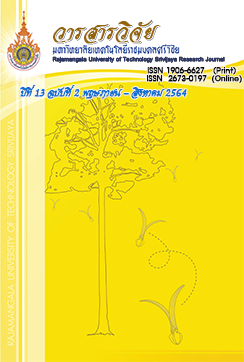Deterioration and Factors Affecting Li River, Lumphun Province from Its Utilization for Agriculture
Keywords:
river deterioration, utilization, farmer, Li watershedAbstract
The aim of this research was to synthesize deterioration of Li river and analyze factors related to Li river utilization for agricultural purposes. Sample size was 232 households. Data was collected by documentary analysis including primary and secondary documents reviews. In addition, questionnaires and non-structured interviews were executed. Data was analyzed by thematic analysis, descriptive statistics, content analysis, and multiple linear regression analysis. The results showed that the amount of water in the Li river tended to decrease during the November to June. Water quality deteriorates were mainly caused by the release of wastewater from the community. In the middle of the river, the contamination of total coliform bacteria (TCB), fecal coliforms bacteria (FCB) and heavy metals were found. Agricultural use of water from the river was at a low level ( = 1.95). The participation of farmers in water resource management activities had significant positive correlations with Li river utilization of farmers (p - value = < 0.0001, r =.598). The farmers made policy recommendations to solve the degenerative problems of the river that there should integrate the activities under the concept of cultural ecology that is being practiced in the community with the creation of community networks.
Downloads
Published
How to Cite
Issue
Section
License
The content and information in the article published in Journal of Rajamangala University of Technology Srivijaya It is the opinion and responsibility of the author of the article. The editorial journals do not need to agree. Or share any responsibility.







